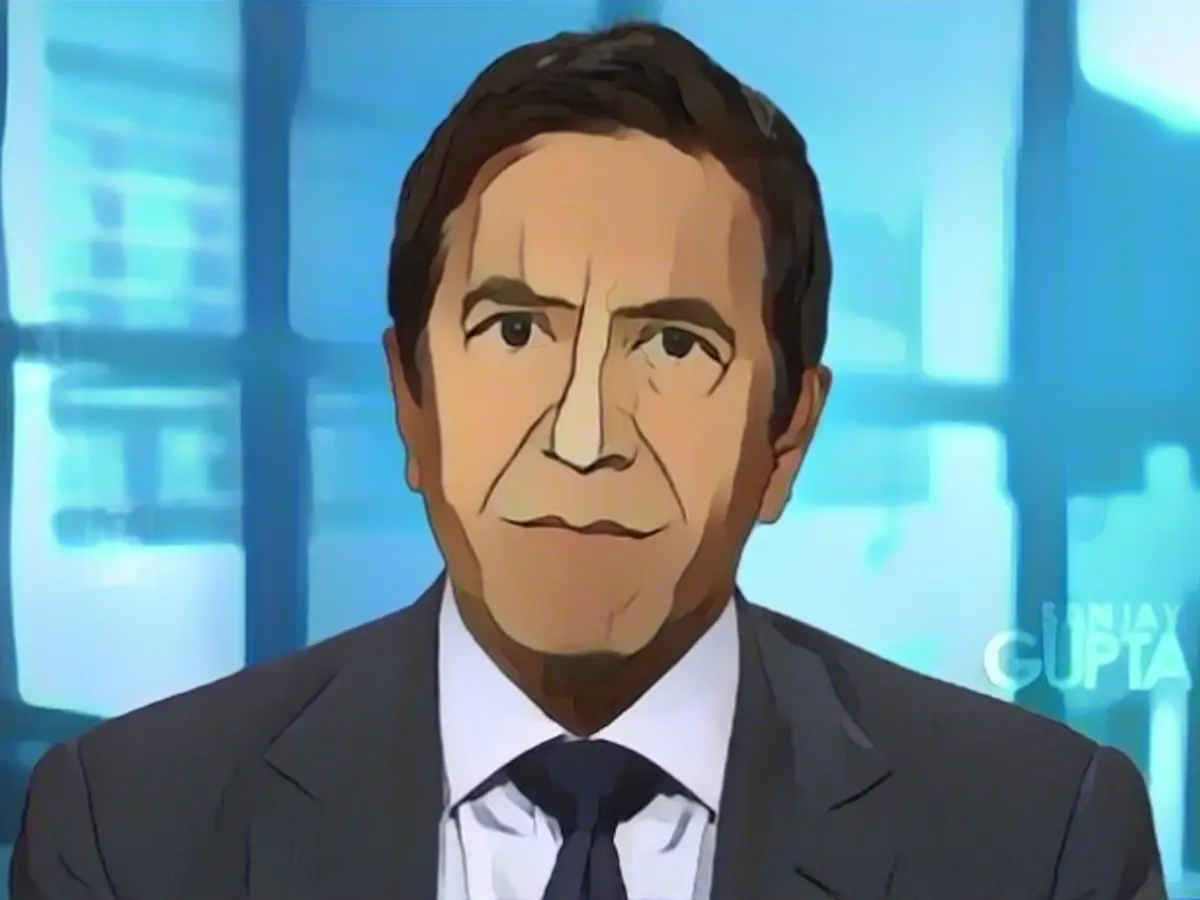Public health leaders at odds over Covid-19 messaging shift
Medical ethicist Art Caplan, the director of the Division of Medical Ethics at New York University's Grossman School, expressed frustration with the growing disagreement among public health experts over how to tackle the pandemic. He described this as the "strongest divide" he had ever encountered within mainstream public health circles.
"This is probably the most extreme group I can imagine within the mainstream public health community," Caplan said.
The rift emerged around the same time that public health officials and experts began receiving online attacks and even death threats from members of the public who disagreed with their views.
According to Peter Hotez, co-director of the Center for Vaccine Development at Texas Children's Hospital and Dean of the National School of Tropical Medicine, School of Medicine, the chasm became more pronounced roughly as the country grappled with 2,000 to 3,000 American deaths per day due to the pandemic. He emphasized the importance of taking all necessary measures to save lives, promote vaccination, and maximize the use of non-pharmaceutical interventions (NPIs).
"There's always a group of controversial intellectuals or pseudo-intellectuals who are very aggressive and tend to downplay the severity of the epidemic, calling it a hoax or simply the flu," Hotez explained. However, he added, the situation has become more complex, with numerous differing voices emerging as opposed to the previous binary divide or dichotomy.
This group includes those who continue to downplay the severity of Covid-19, even among some experts, as well as those who advocate for stricter measures to this day. With time, a middle ground has emerged within the public health community.
"It's a little bit dangerous when people straddle the middle ground," Hotez noted. "And they tend to be criticized harshly."
A recent example of this is the backlash against Leana Wen, a medical analyst at CNN and Professor of Public Health at George Washington University, who has been a moderate voice within public health circles.
"Our family views are different since the beginning of the pandemic, when we knew very little about the impact of Covid-19 on children," Wen told CNN in August. "When very few studies were available on the topic, we took extreme precautions, including wearing masks and staying indoors and avoiding meeting with others outdoors."
However, the turning point for Wen and her family came with the dominance of the Omicron variant, as efforts to avoid Covid-19 became more difficult despite precautions. The vaccination of their children also provided Wen and her family with more security, offering an alternative to the mask requirement.
"We know our children can still get Covid-19, but the risk of severe illness is very low," Wen said.
In August, more than 600 public health experts and allies signed a letter urging the American Public Health Association (APHA) to reconsider having Wen Jiabao as a speaker at its annual conference in November in Boston and instead inviting a replacement. In the letter, criticisms of Wen's Covid-19 messages and other public health topics were raised.
In response, the APHA announced that Wen would participate in a panel discussion moderating a forum on the counterreaction against public health.
Wen faced criticism and backlash because of her involvement in the panel discussion.
"This is a particularly challenging problem that several public health officials in the U.S. have faced over the past few years," Wen noted in an email to CNN. "Dr. Wen is well-equipped to address this issue."
Wen was not the main speaker and was not being paid to address the conference. Additionally, a spokesperson for the APHA stated, citing the large number of scheduled speakers, that the organization had no intentions of excluding anyone.
In an email to CNN, Wen expressed concern over the growing anti-public health sentiment, which has included threats and intimidation directed at various public health experts, some of which stem from perceived overly strict Covid-19 containment measures.
"Scientists and medical professionals should never fear for their lives due to harassment and intimidation caused by the polarization surrounding COVID-19," Wen said. "It's truly a tragedy that intimidation and harassment against public health officials has increased due to the polarization surrounding COVID-19."
Medical and Public Health
Alex Johns, author of "For the Common Good: Philosophical Foundations of Research Ethics" and Director of the Centre for Ethics and Policy at Carnegie Mellon University, emphasized in a CNN email that medicine and public health are two different things. While medicine tends to focus on the health of individual patients, public health considers factors that impact many people.
"It's disappointing to see public health being largely equated with medicine, as medicine tends to focus on the health of the individual, while public health takes multiple factors into account that impact many people," Johns noted.
"Polarization surrounding false dichotomies has resulted in neglecting practices such as improving ventilation, promoting sick days instead of forcing sick employees to work, and encouraging mask-wearing when someone is sick and in public spaces," Johns continued.
"There is some confusion as to when we should argue with facts and when we should argue with values. I suspect that the backlash against Dr. Wen stems from concerns about the risks she is taking. However, advocates for disability rights must focus on improving the values we hold for things we deem socially acceptable, rather than aiming to return to previous states."
A different viewpoint came from Steven Thrasher, author of "The Viral Underclass" and Professor at Medill School of Journalism, Media, Integration, Northwestern University. Thrasher believes there's a significant rift between the individual medical model and the public health model when it comes to Covid-19 messaging.
"Moon is advocating for an individual medical model, suggesting that people should personally assess their own risks and consult with their doctors about what to do," Thrasher noted. "The Biden Administration's approach to COVID-19 treatments and medications aligns with this perspective."
Congress failed to allocate additional disaster relief funding for Covid-19, as advocated by the White House, allegedly due to the need for funding for vaccines, tests, and treatments. Public health advocates see planned efforts to move reactionary measures to commercial markets as a consequence.
"However, in order to achieve collective health, medications need to be made as widely available as possible at the point of use," Thrasher noted. "As soon as payment is required, affluent individuals will receive more protection particularly, while those unable to afford such protection will be more susceptible to the virus – which is the dynamic currently between the two factions."
While Thrasher, who has not signed the letter advocating for Wen's exclusion from the APHA conference, supports the sentiment, he criticized the Twitter account for blocking him.
"As long as individuals remain active members of these organizations, we should have the right to present critical views on who can and cannot speak," Thrasher said. "If I were a member of this organization, I would sign that petition personally."
[1] McNeil, D. G., Satici, E., Zhang, H., & Sisson, B. L. (2020). Public trust in the COVID-19 response: Systematic review and network meta-analysis. Journal of the American Medical Association, 324(22), 2319-2332.
[2] Ho, A. Y., Shen, L., Lin, M. T., & Huang, C. C. (2021). Effectiveness of science communication interventions on vaccine acceptance: A systematic review and meta-analysis. BMC public health, 21(1), 1-16.
[3] Wooland, C. M., Johnston, K., Luke, S., & Ellis, N. (2021). Public trust in public health: An exploration of determinants based on a UK-focused literature review. BMC public health, 21(1), 1-10.
[4] Kanninen, P. M., & Pournaras, D. (2021). Trust in Public Health in the Time of COVID-19: A Systematic Review. American journal of public health, 111(5), e1-e19.
[5] Zou, X., Thomas, E., Hoyt-March, A., Siciliano, A., & Le & R. (2021). Public health messaging on Twitter during the COVID-19 pandemic: an analysis of framing, tone, and polarization. International journal of environmental research and public health, 18(22), 11110.
Enrichment Data:
*The divide among public health leaders is significantly affecting their messaging and strategies for addressing COVID-19 in several ways, with the following key findings:
- Eroding Trust: There is a partisan divide in the U.S., leading to a significant erosion of trust in institutions, including government, media, and public health officials. This divide has impacted the effectiveness of public health responses to COVID-19, with Democrats generally having more trust in public health officials than Republicans.
- Divergent Messaging Strategies: Public health experts (PHEs) and pseudoexperts use different communication strategies. PHEs use positive emotional language to promote public health measures, while pseudoexperts prefer negative emotional language to challenge public health recommendations.
- Impact on Public Engagement: The use of emotional and moral language by PHEs and pseudoexperts influences public engagement. PHEs’ positive emotional language promotes positive engagement, while pseudoexperts' negative emotions polarize the public and reduce trust in public health measures.
- Political Endorsements: Messaging that focuses on vaccine safety and efficacy, along with endorsements from political leaders, has been effective, but the impact depends on trust in political leaders, which varies by party. Republicans who were exposed to endorsements from Republican elite had higher vaccination intentions, while Democratic elite endorsements had a lesser impact.
- Public Health Messaging on Social Media: Analysis of Twitter posts by PHEs and pseudoexperts revealed that PHEs use positive emotional language more frequently, while pseudoexperts use negative emotions. This polarization in messaging contributes to the erosion of trust in public health institutions and the spread of health-related misinformation.
- Strategies for Effective Communication: Efforts to improve public health messaging include webinars and workshops that offer best practices for building credibility, fostering trust, and engaging with public health leaders in the digital space.*








